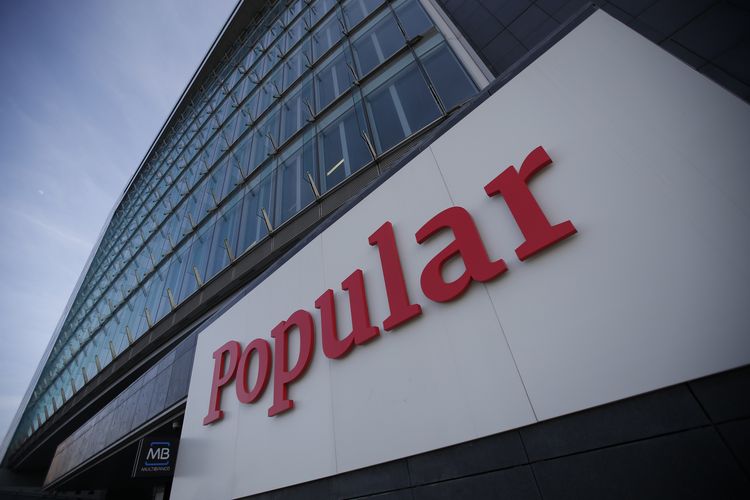Banco Popular has fired the opening salvo in what is expected to be a long and difficult battle to raise billions of euros in fresh capital, putting its US and credit card businesses up for sale while work continues on a much broader recapitalisation plan.
Now on its third chief executive in less than a year, the Spanish lender is under acute pressure to tackle bad loans, foreclosed property and seized land with a face value of €36bn once and for all after years of half-hearted measures.
Confidence in the bank has been battered by uncertainty, upheaval - and accounting errors that came to light last month. Depositors have pulled €10bn out of Popular over the past year, while shares are down 98% from their peak a decade ago.
Ignacio Sanchez-Asiain, who only took over as CEO last month, now faces the arduous task of convincing investors to stump up more cash to pay for the clean-up. It will be the bank’s fourth capital raise in five years, and comes less than a year after its last €2.5bn rights issue.
“Shareholders clearly have lost their patience. They’ve been asked three times already to put money into a ship that keeps on sinking,” said one banker who counts Popular as a client. “It’s very difficult to see how these guys are going to fill the gap.”
CAPITAL HOLE
The asset sales could raise as much as €1.5bn, but the capital hole may be four times that. The bank is being pushed to write down its €36bn of non-performing assets, which are currently booked at 55 cents on the euro, to more realistic levels.
Writing down the assets would bring them more into line with market prices and would facilitate sales and securitisations. Bringing carrying values down to even 50 cents would create a €4bn capital hole - but bigger writedowns might be needed to tempt buyers in.
The bank has been provisioning as much as it can. But, with capital levels a measly €325m above the minimum regulatory requirement, its ability to take writedowns has been restricted to whatever profits its underlying businesses can make.
“We are clearly willing to increase the pace of reduction, but this cannot be done on an insulated basis,” chief financial officer Miguel Escrig told analysts on a conference call. “This has been consistent with the capital availability and the plans we set there.”
How much capital might be available from the market is the big unknown. The bank’s market capitalisation currently stands at around €3.3bn, although past rights issues - such as the one in 2012 - have raised multiple times the value of outstanding equity.
More uncertain is whether banks would be willing to underwrite a deal. Popular’s last rights issue is being investigated for alleged undeclared loans to shareholders used to finance their take up, which could result in equity having to be written down.
“Who would guarantee a rights issue with these ongoing legal issues?” asked one analyst. “If part of the rights issue needs to be deducted from capital, the bank is in breach of its requirements. In addition, you could have shareholders that might want to sue the bank.”
POTENTIAL BUYER?
One hope is that a buyer - a larger Spanish institution such as Santander or BBVA, or even a foreign bank - could step in, but some believe that a deal would be hard to do with such legal and valuation uncertainties still left unresolved.
“There is no M&A story,” said the analyst. “It is impossible to touch Popular in its current state. It is indigestible for a buyer.”
Others are more optimistic, but still see hurdles.
“The best outcome for them would be to be sold to Santander or BBVA but the sticking point is [that] while they might find a buyer, Popular is still a big bank and it would be a chunky acquisition,” said Filippo Alloatti, a credit analyst at Hermes Investment Management. “An acquirer would require another clean up.”
Last Thursday the bank denied it was urgently seeking to be taken over, after a Spanish news site reported it had hired JP Morgan and Lazard to find a buyer.
“It is impossible to touch Popular in its current state. It is indigestible for a buyer”
If private money is not found, then bondholders might be on the hook. The bank’s Additional Tier 1 instruments have plummeted in recent weeks and now trade at just above 80 cents on the euro to yield 16%, amid fears coupons may be missed.
For now, so long as the deposit outflows do not pick up, the bank has time to try to formulate a plan.
If it can resolve its legal issues and put together a believable clean-up plan, then it might have a stab at convincing investors to put in fresh equity.
Successful sales of the US and credit card businesses - at decent prices - would be a first step towards that.
“We are working on divesting several of our non-core assets … with advanced discussions going on with potential investors,” said CEO Ignacio Sanchez-Asiain on the same analyst call. “There will be no fire sale. That said, we’re confident that we will soon be able to announce some progress.”
